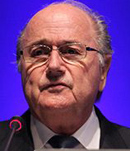By Andrew Warshaw in Doha
January 7 – The prospect of a winter World Cup in 2022 moved a giant step closer today when FIFA President Sepp Blatter (pictured) gave the concept his personal backing.
Confirming for the first time that the tournament in Qatar would be too exhausting for players in the stifling desert-like heat of mid-summer, Blatter said playing halfway through the European season was the only realistic course of action despite the logistical problems it would cause.
“I expect it will be held in the winter,” said Blatter.
“We have time to look at this question – it is still 11 years away – but we must decide the most adequate period for a successful World Cup, which means January or the end of the year.”
Summer temperatures in Qatar can soar to 50 degrees Celsius while January is the equivalent of a European summer.
Blatter made it clear that FIFA could not, on its own, force a winter World Cup on Qatar and that a formal request would have to come from the local organising committee.
He shrugged off suggestions that FIFA would be bending the rules by giving the green light to a January tournament AFTER rather than before last month’s vote and despite the fact that Qatar’s original bid document made no reference to switching from the traditional June and July period.
“Do not forget there are still 11 years to go and although we have the basic conditions of their bid for a June and July World Cup, the FIFA Executive Committee is entitled to change anything that was in the bid,” said Blatter.
“We haven’t broken the rules, but when you play football you have to protect the main people – the players.
“There were already rumours about a winter world Cup even before.”
Blatter, speaking at a round table session a few hours before the opening game of the Asian Cup in Doha – played ironically in exactly the same time period now being debated for 2022 – talked for almost an hour on a variety of subjects but the World Cup in Qatar dominated discussions.
He insisted that taking the World Cup to new territories, in this case the Middle East, was the prime reason why Qatar won such a landslide victory in Zurich on December 2, though that argument was hardly convincing given that Australia, with a far greater sporting history, also wanted to host the event and only received one vote.
Much has been made of the total lack of credence given to the FIFA inspection tours of the bidding nations and the technical reports that followed.
Both ultimately counted for nothing – Qatar’s was even ranked bottom – but Blatter refused to admit that FIFA’s credibility had been undermined.
“You can have the best report and the worst report but finally it’s human beings that make the decision,” he said.
“Even back to my predecessor, it was always a wish to make football universal.
“We have been to Africa and again it was time to go to new territories.
“It was all a strategy within the double decision for 2018 and 2022 – it’s a logical move.”
Asked specifically why England failed so dramatically for 2018, picking up just two votes, Blatter suggested there may have been some resentment among FIFA voting members to Britain’s long-standing privileges.
Britain has an automatic rather than an elected vice-presidency and is also responsible, in conjunction with FIFA itself, for establishing the rules of the game and making any changes to the status quo.
“Since 1946 they have been guaranteed one vice-presidency and 50 per cent of the International FA Board,” said Blatter.
“There are no more privileges you can give someone.
“They were polite and gentlemanly [at the vote].
“Maybe inside FIFA there is some resentment.”
Contact the writer of this story at zb.ll1745026949abtoo1745026949fdlro1745026949wedis1745026949ni@wa1745026949hsraw1745026949.werd1745026949na1745026949

